Studies Find Social Media Seriously Harms Your Mental Health
- Last Updated: July 14th, 2025

Attorney Jessica Paluch-Hoerman, founder of TruLaw, has over 28 years of experience as a personal injury and mass tort attorney, and previously worked as an international tax attorney at Deloitte. Jessie collaborates with attorneys nationwide — enabling her to share reliable, up-to-date legal information with our readers.
Legally Reviewed
This article has been written and reviewed for legal accuracy and clarity by the team of writers and legal experts at TruLaw and is as accurate as possible. This content should not be taken as legal advice from an attorney. If you would like to learn more about our owner and experienced injury lawyer, Jessie Paluch, you can do so here.
Fact-Checked
TruLaw does everything possible to make sure the information in this article is up to date and accurate. If you need specific legal advice about your case, contact us by using the chat on the bottom of this page. This article should not be taken as advice from an attorney.
Key takeaways:
- Excessive use of social media can lead to feelings of loneliness, depression, anxiety, and exacerbate mental health problems.
- Social media platforms are designed to be addictive, resulting in feelings of exclusion, fear of missing out (FOMO), and unhealthy comparisons with others.
- It's crucial to set limits on social media usage and to be mindful of how it affects mental well-being.
Studies Find Social Media Seriously Harms Your Mental Health
Question: Is there evidence suggesting social media seriously harms your mental health?
Answer: Yes, several notable studies suggest social media seriously harms your mental health, often leading to anxiety, depression, feelings of exclusion, and even physical ailments.
Social Media Seriously Harms Your Mental Health
On this page, we’ll provide an overview of research suggesting social media seriously harms your mental health, factors influencing unhealthy social media use, ways to modify social media use for better mental health, and much more.
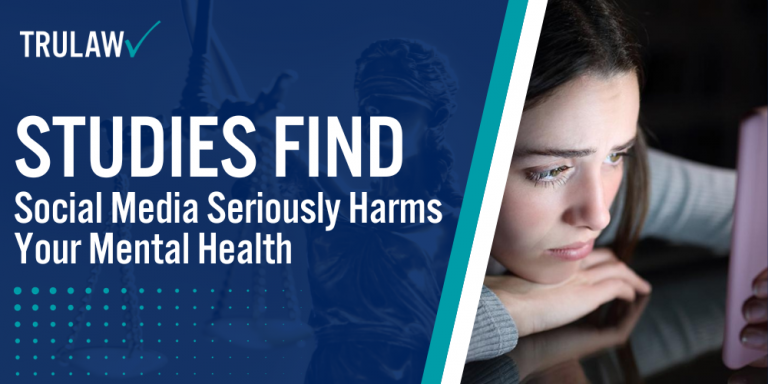
In recent years, researchers have been increasingly interested in understanding the effects of social media on mental health.
Several notable findings of social media harming your mental health include:
- Increased screen time correlates with feelings of loneliness and depression.
- The pressure to maintain a perfect online presence leads to anxiety and poor self-esteem.
- The habit of constantly comparing oneself to others on social media fosters feelings of inadequacy.
If you’ve suffered from mental health issues as a result of using these platforms, contact TruLaw today using the chat on this page to receive an instant case evaluation.
Table of Contents
Connection Between Social Media and Mental Health
The relationship between social media use and social media harms, has garnered significant attention, as various studies link extensive time on different platforms to a spectrum of psychological concerns.
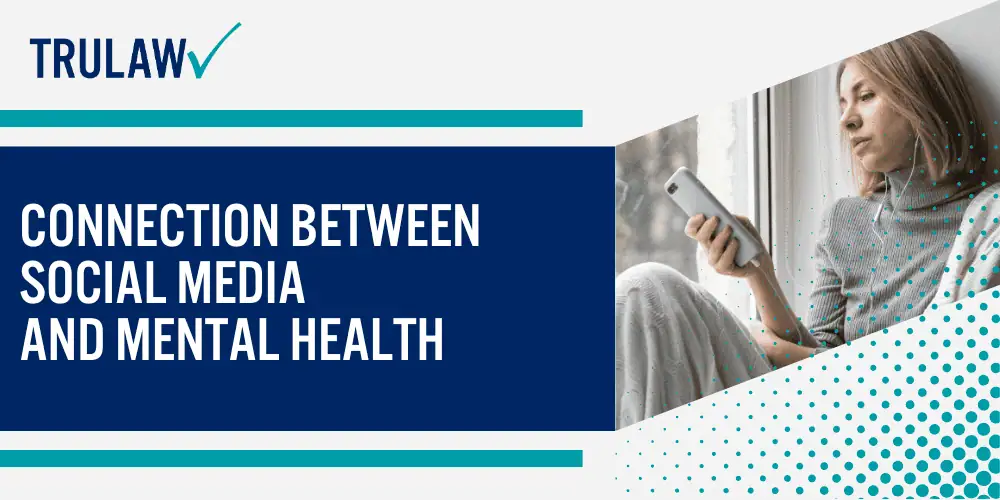
The frequent engagement with social media harbors both positive aspects as well as potential harms; however, research by the Pew Research Center reveals social media seriously harms your mental health
This section examines why human beings may feel bad after spending too much time scrolling through posts, highlighting the underlying dynamics at play that challenge one’s sense of self-worth and life satisfaction.
- Negative Aspects of Social Media: These include elements such as envy-triggering highlight reels from peers or strangers leading to negative social comparison, which ultimately undermine self-esteem.
- Impact on Mental Health: Prolonged app usage doesn’t just change how people tend to spend their days but also influences their mindset, contributing to an increased risk of developing mental health cases
Negative aspects of social media
Despite the connections and community social media promises, it can have serious repercussions on mental health.
Users often experience a decline in self-esteem after scrolling through perfect pictures and highlight reels of others’ lives, leading to negative social comparison and a sense of inadequacy.
The design of these platforms, likened to a slot machine, can also foster addictive behaviors, as users constantly seek validation through likes and comments.
This compulsive use has been pinpointed as a driving force behind an array of mental health issues including depression, anxiety, body image concerns—even eating disorders among vulnerable young people.
The rapid rise in youth mental health cases correlates with the prevalence of smartphones and unlimited access to multiple platforms like Instagram or Facebook.
Such platforms have powerful psychological hooks that make them nearly irresistible for many teens who spend excessive amounts of time online.
Meta Platforms and other companies face mounting criticism over their failure to protect young users from harm—evident from internal company documents revealing knowledge about these risks while actively exploiting brain development vulnerabilities for profit retention.
The increase in lawsuits against such entities signifies society’s growing impatience with the negative impact social media is having on our world—particularly our youth—and the urgent need for age-appropriate standards and transparency regarding app usage harms.
How social media use affects mental health
Social media use has been increasingly linked to mental health issues, particularly in young people.
Multiple studies show a clear connection between time spent scrolling through apps and feelings of depression, anxiety, and loneliness.
This is compounded by the habit-forming design of many social media platforms that encourage continuous engagement through likes, comments, and shares, leading to compulsive social media use.
Users can develop feelings of inadequacy and low self-esteem by comparing their lives with the idealized highlights posted by friends and celebrities.
These negative comparisons are powerful; recent research points out that just seeing others’ curated photos can leave individuals dissatisfied with their own life experiences.
The impact on sleep cannot be overlooked as well.
Frequent late-night phone use disrupts normal sleep patterns—a vital component for cognitive function and overall physical health—which further exacerbates mental health struggles like depression and memory loss.
Social media seriously harms your mental health, not only by facilitating unhealthy comparisons but also by directly affecting biological processes essential for wellness.
The lure of constant connectivity holds immense power over users’ daily habits; for some teens, especially, what begins as casual browsing may escalate into addictive behavior detrimental to their mental well-being.
How Social Media Use Can Harm Mental Health
Social media’s impact on mental health is a growing concern, as recent studies have revealed alarming connections between online activity and negative psychological effects.
The immersive environment of social media platforms can lead to an increased risk of depression and anxiety, with users often experiencing heightened feelings of inadequacy and distress due to constant exposure to curated life highlights from others.
One significant issue is the way social media disrupts sleep patterns; scrolling through feeds late into the night not only hinders restorative sleep but also increases the vulnerability to mood disorders.
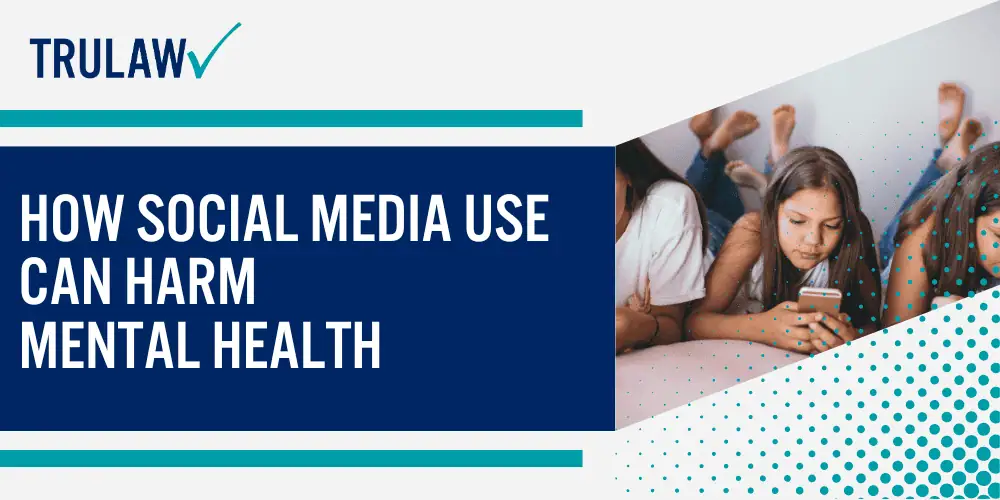
Furthermore, relentless comparison driven by meticulously crafted posts can dramatically affect self-esteem, making individuals feel insufficient in their accomplishments or appearance.
Equally, pressing is the harm caused by cyberbullying and online harassment—aggressions that are magnified in the digital space, where anonymity emboldens aggressive behavior.
These toxic interactions can leave deep emotional scars, contributing substantially to a user’s overall mental well-being degradation.
Increased risk of depression and anxiety
Engaging with social media has a significant downside, as numerous studies highlight its link to heightened levels of depression and anxiety.
In particular, findings point to college students who frequently use these platforms experiencing increased rates of these mental health issues.
The drive for likes, shares, and virtual approval can escalate into an unhealthy obsession that chips away at users’ sense of well-being.
The landscape of online interaction also breeds social media envy, where individuals compare their lives to the curated highlights they see in others’ posts.
This act alone can trigger feelings of inadequacy and low self-esteem, fueling the cycle of anxiety and depressive symptoms.
As people scroll through endless feeds, the constant barrage of success stories and picture-perfect moments creates a breeding ground for negative mental health impacts.
Disturbed sleep patterns
Disturbed sleep patterns are a troubling consequence of social media use, particularly among adolescents.
The light from screens can interfere with melatonin production, the hormone that regulates sleep-wake cycles.
As young adults scroll through their feeds late into the night, they expose themselves to constant stimulation and blue light, which can throw off natural sleep rhythms.
This disruption not only affects their ability to fall asleep but also diminishes the quality of rest they receive.
The link between regular social media usage and poor-quality sleep is more than anecdotal; it’s supported by research highlighting its negative impact on mental health.
Sleep deprivation exacerbates issues like depression and anxiety, creating a vicious cycle where restless nights lead to stressful days and increased reliance on digital connections for comfort.
It’s crucial for individuals—especially youth—to understand how late-night browsing could be compromising their well-being and contributing to broader concerns raised in legal actions against major social media platforms.
Comparison and self-esteem issues
Scrolling through social media feeds can often feel like an endless highlight reel of other people’s lives.
Users frequently post about their successes, picture-perfect vacations, and the best moments of their daily routine.
This flood of positive imagery can lead individuals to compare themselves and others constantly.
It is easy to forget that these posts may not represent real life accurately but rather a carefully curated version of it.
As users measure their own lives against this unrealistic standard, they may experience feelings of inadequacy and low self-esteem.
The pressure to maintain a particular image on social media platforms contributes heavily to these comparison traps.
Teen girls, in particular, face intense scrutiny over body image issues, which are magnified by what they see online.
Endlessly comparing one’s appearance or lifestyle with those perceived as better or more successful fuels negative self-perception and dissatisfaction with one’s achievements.
These patterns have significant implications for mental health, contributing to depression and anxiety among heavy social media users—issues now being highlighted in lawsuits against major social media companies for neglecting young people’s mental health.
Cyberbullying and online harassment
Cyberbullying and online harassment are serious issues that can profoundly affect a person’s mental health.
With the use of technology to intimidate or harm, individuals may contend with relentless negative messages that lead to feelings of fear, isolation, and distress.
This form of bullying goes beyond school walls and can follow people into their homes through computers and smartphones.
Adults are not immune; workplace cyberbullying is especially damaging among junior employees, who may feel powerless against online attacks from coworkers.
The research underscores how these harmful experiences contribute to an increased risk of depression, anxiety, and other mental health problems.
The impact is far-reaching, prompting many to seek professional help to overcome the psychological scars left by virtual harassment.
Addressing cyberbullying proactively is essential—remaining silent only allows the behavior to persist unchallenged.
Taking steps like documenting incidents, blocking bullies, and reaching out for support can mitigate its detrimental effects on well-being.
Factors Influencing Unhealthy Social Media Use
Personal traits and external pressures often steer individuals toward unhealthy social media patterns.
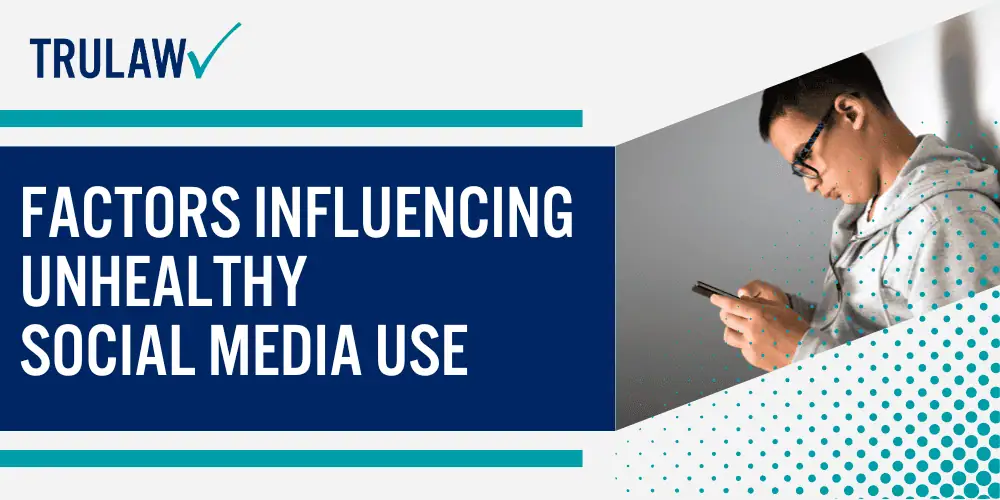
An individual’s personality, such as a tendency towards comparison or need for approval, along with societal demands like the push to be constantly connected, can create a perfect storm for detrimental online habits.
Individual’s personality and mindset
Your personality and mindset play significant roles in how you interact with social media and its impact on your life.
Some individuals may be more prone to comparing themselves unfavorably to others they see online, which can lead to a drop in self-esteem or an increase in feelings of anxiety and depression.
This susceptibility often depends on personal traits, such as confidence levels or tendencies towards negativity.
Not everyone is equally affected by the pressures of social media.
Certain mindsets can serve as a shield against the harmful content pervasive online; for example, people who possess a strong sense of individuality and focus on their real-life achievements may not feel diminished by idealized portrayals they encounter on internet platforms.
However, those with lower resilience might find it harder to shake off negative emotions resulting from online interactions or cyberbullying incidents.
Understanding that these internal factors influence our mental responses underlines the complexity behind social media’s influence on our mental health.
Environmental and societal pressures
Environmental and societal pressures play a significant role in unhealthy social media use.
Individuals often face expectations to present an idealized version of their lives online, which can lead to constant comparison and self-doubt.
The desire for likes, shares, and followers can become a relentless pursuit that overshadows real-world interactions and priorities.
The rise of cyberbullying adds another layer of distress, with anonymous or known aggressors using platforms to target individuals, exacerbating issues like low self-esteem and mental health challenges.
This harmful environment contributes to the mental health crisis among youth as they spend increasing amounts of time navigating these powerful yet potentially detrimental spaces on apps teens frequently use.
With attorneys general from various states taking legal action against companies like Instagram’s parent company Meta over allegations that they knowingly induced young children into addictive social media use, the focus on environmental factors intensifies.
These lawsuits highlight concerns over manipulative features within apps designed to capture and hold the attention of users at any cost—often leading to negative impacts on both mental and physical health.
Signs of Unhealthy Social Media Use
Recognizing the signs of unhealthy social media use is crucial in mitigating its impact on mental health.
Individuals may experience an obsessive need for online validation, frequently checking for likes, comments, and shares, which can turn into a compulsive behavior.
This preoccupation often leads to reduced productivity and increased feelings of social isolation as users exchange real interactions for digital ones.
Moreover, a clear indicator of harmful social media habits is when there’s a negative impact on real-life relationships due to excessive screen time or engagement with these platforms.
People might find themselves comparing their lives to others’, resulting in decreased self-esteem and satisfaction with their own experiences.
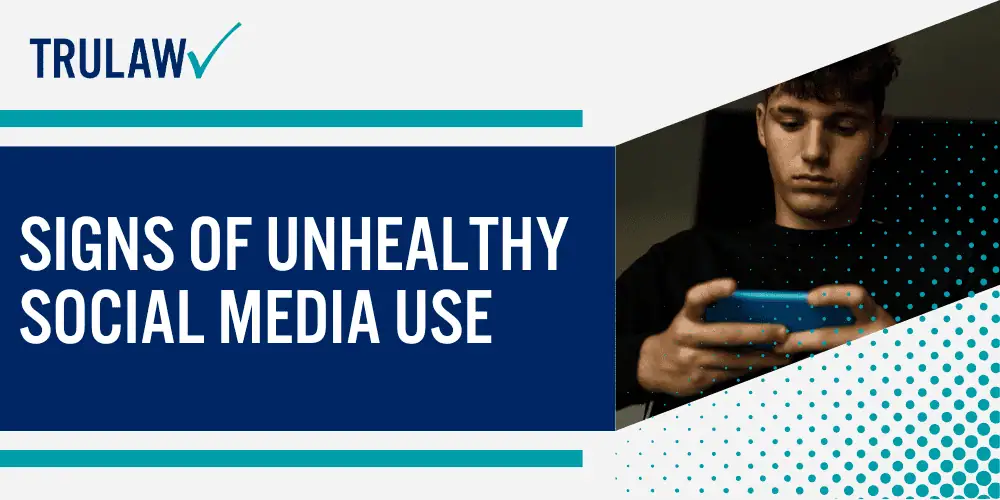
Addressing these signs early can prevent long-term psychological effects and promote healthier internet habits that support overall well-being.
Discover effective strategies to enhance your life offline by continuing with our comprehensive guide.
Obsessive need for online validation
The hunt for likes, comments, and shares on social media platforms has become a driving force for many users.
This constant quest for online validation can seriously impact mental health, leading to an addictive cycle of seeking approval through digital reactions.
The effects are often harmful; as the Pennsylvania study points out, such behaviors are strongly linked to feelings of inadequacy and low self-esteem.
Individuals find themselves comparing their lives to the polished snapshots presented by others, fostering envy and a sense that one’s own life doesn’t measure up.
What starts as occasional checking of notifications can quickly escalate into an obsession, where the number of virtual approvals dictates mood and self-worth.
As research indicates over recent years, this dependence on social media validation is creating serious mental health issues among users.
It’s important to recognize these patterns—a consistent need for validation from outside sources could signal underlying emotional struggles that require attention far beyond any temporary boost from online accolades.
Decreased productivity and social isolation
Excessive social media use often leads to decreased productivity, as users find themselves scrolling through feeds for hours, losing valuable time that could be spent on work or creative pursuits.
Instead of completing tasks or engaging in hobbies, many individuals fall into the trap of endlessly consuming content, which can significantly hinder their ability to achieve goals and manage daily responsibilities.
This pattern not only eats away at one’s personal growth but also contributes to a rise in procrastination and incomplete projects.
Moreover, despite being more connected than ever online, heavy social media consumption can result in social isolation.
Users may feel disconnected from their physical surroundings and struggle with forming meaningful relationships offline.
Virtual interactions replace face-to-face connections, leading to a sense of loneliness and detachment from community and support networks.
As real-life interactions diminish, so does the motivation to participate in group activities or seek out new social experiences, further compounding feelings of isolation.
Negative impact on real-life relationships
Social media’s gravitational pull can disrupt real-life interactions and fuel a cycle of loneliness.
While users may seem more connected than ever, the quality of those connections often suffers.
Hours spent scrolling through feeds and crafting virtual personas steal time from face-to-face conversations with family and friends.
This shift towards online engagement over in-person experiences can strain relationships, as individuals might neglect to foster intimacy and trust that only real-world interactions can build.
The paradox of social media is never clearer than when examining how it affects our societal fabric.
It tempts us with the promise of endless connection but may widen the gap between us and our loved ones.
Honest conversations become replaced by likes, shares, and comments – hollow substitutes for meaningful engagement.
Emotions cannot be conveyed through screens with the same nuance as they are conveyed through body language or tone of voice in personal encounters, leading to misunderstandings that can erode relationships over time.
Ways to Modify Social Media Use for Better Mental Health
Social media can be a double-edged sword; it connects us, yet it can potentially disrupt our mental well-being.
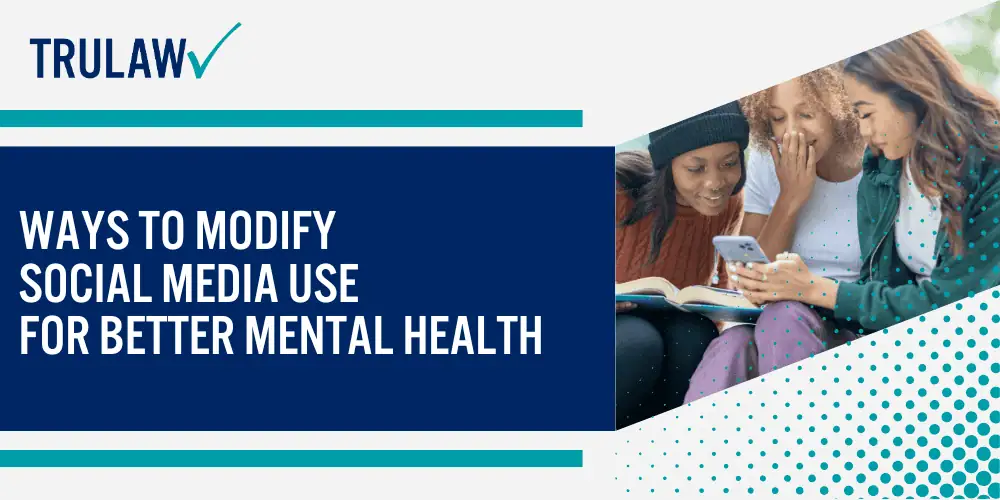
To preserve and enhance our mental health, altering how we engage with these powerful platforms is crucial.
Reducing time spent on social media
Reducing your time on social media can significantly improve mental health and well-being.
It’s an important step in protecting yourself from the potential harms associated with excessive online engagement.
- Set specific time limits: Decide how much time you want to spend on social media each day and stick to it. Use apps or built-in smartphone features to alert you when your time is up.
- Implement a “no-social-media” bedtime: Avoiding social media for at least an hour before sleep can lead to better rest and a fresh mind in the morning.
- Create tech-free zones: Make sure areas of your home, like the dining room or bedroom, are places where you don’t use social media.
- Engage in other activities: Fill your time with hobbies, exercising, or spending face-to-face time with friends and family.
- Mindful scrolling: Be aware of why you’re using social media—is it out of habit or for a specific purpose? This awareness can help reduce aimless browsing.
- Disable notifications: Turn off non-essential notifications to prevent the urge to check your phone constantly.
Consciously decide to limit your hours online.
Set specific times of the day when you will check social media and stick to them.
This discipline prevents endless scrolling and helps maintain a healthier daily routine.
Shifting focus to more positive content
Actively seek out pages, groups, or individuals that inspire positivity rather than triggering negative emotions.
Follow accounts related to hobbies, education, or uplifting news—content that adds value rather than detracts from your self-esteem.
- Choose Inspirational Profiles: Follow accounts that inspire and motivate you. Look for profiles sharing uplifting stories, educational material, and positive affirmations that can enrich your daily life.
- Use Content Filters: Many apps offer tools to filter out harmful content. Use these features to customize your feed, ensuring you see more helpful and inspiring posts.
- Engage with Constructive Communities: Join groups or forums focused on hobbies, personal growth, or support networks. These communities should promote encouragement and beneficial exchanges over critical or harmful interactions.
- Limit Exposure to Troublesome Topics: Be aware of how certain subjects impact your mood. If news stories or political debates stir up stress, consider steering clear of them.
- Support Friends’ Positive Posts: Interact with friends’ posts that share successes, happy moments, or constructive ideas. Your engagement helps create a supportive network for everyone involved.
- Curate a Balanced Perspective: While being informed is good, ensure your feed includes diverse viewpoints that prevent echo chambers and promote understanding rather than divisiveness.
- Practice Digital Gratitude: Reflect on the aspects of social media you are thankful for; perhaps connections made or knowledge gained. Share posts expressing thanks which can resonate with others.
Prioritizing real-life relationships
Prioritizing real-life relationships is essential in combatting the negative impacts of social media on our mental wellbeing.
Investing in face-to-face interactions can significantly improve overall happiness and satisfaction.
- Form meaningful connections: Engage in regular activities with friends and family to strengthen bonds. Take part in group hobbies, sports, or volunteer work where social interaction is a key component.
- Schedule quality time: Set aside specific times for uninterrupted conversations and experiences with loved ones. Whether it’s a family dinner or coffee with a friend, prioritize these moments over scrolling through feeds.
- Encourage open dialogue: Discuss the effects of social media use openly with peers and family members. Share experiences and support each other in finding a healthier balance between online engagement and personal relationships.
- Create memorable experiences: Plan outings that require collaborative efforts such as hiking, cooking classes, or escape rooms. These shared experiences can foster deeper connections than those formed through digital platforms.
- Limit distractions: Make a conscious effort to put away phones during social gatherings. Create an environment where everyone can be present without the constant pull of notifications.
- Celebrate achievements together: Invite people to celebrate important milestones in person rather than just sharing successes online. This enhances the joyous occasion and reinforces the value of your real-world network.
- Offer help beyond likes: Under challenging times, provide support through more substantial means than just social media reactions. Offering your time by helping or simply lending an ear can be far more impactful.
Remind yourself about the joy of human interaction beyond screens.
Prioritize face-to-face contact by organizing social activities or simple get-togethers with friends and family, which are critical for emotional support.
Practicing gratitude
Practicing gratitude has remarkable effects on both physical and psychological well-being.
It creates a positive cycle that can counterbalance the pressures of social media and lift one’s overall health.
- Acknowledge daily wins: Take time to recognize personal achievements and positive moments each day, no matter how small they may seem.
- Keep a gratitude journal: Regularly writing down things you’re thankful for can increase awareness of life’s positives and help shift focus away from social media stressors.
- Express thanks to others: Showing appreciation towards friends, family, and even strangers strengthens relationships and fosters a supportive community.
- Volunteer your time: Giving back to the community helps others and provides a sense of purpose and satisfaction that overshadows online negativity.
- Meditate on gratitude: Mindfulness meditation focused on gratitude enhances emotional regulation, reducing stress and improving mental health.
- Share positive experiences: Talk about good news and uplifting stories with peers to create an environment that values joy over comparison or envy.
- Reflect on past challenges: Recognize how obstacles have led to growth and strength, reinforcing resilience in the face of online adversity.
If you’ve suffered from mental health issues as a result of using these platforms, contact TruLaw today using the chat on this page to receive an instant case evaluation.
Helping Children and Teens with Unhealthy Social Media Use
Establish clear boundaries and proactive strategies to safeguard the mental well-being of young users, reinforcing their self-worth beyond the digital realm.
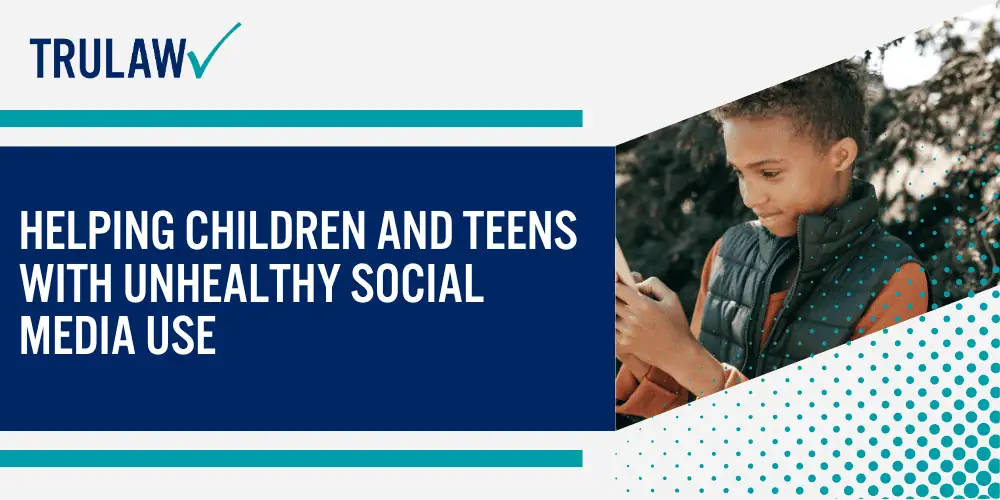
Learn more about fostering a secure online environment that promotes healthful habits for our youth.
Setting limits and monitoring their online activity
To protect children and teens from the negative impacts of social media, it’s essential to establish boundaries and keep an eye on their internet interactions.
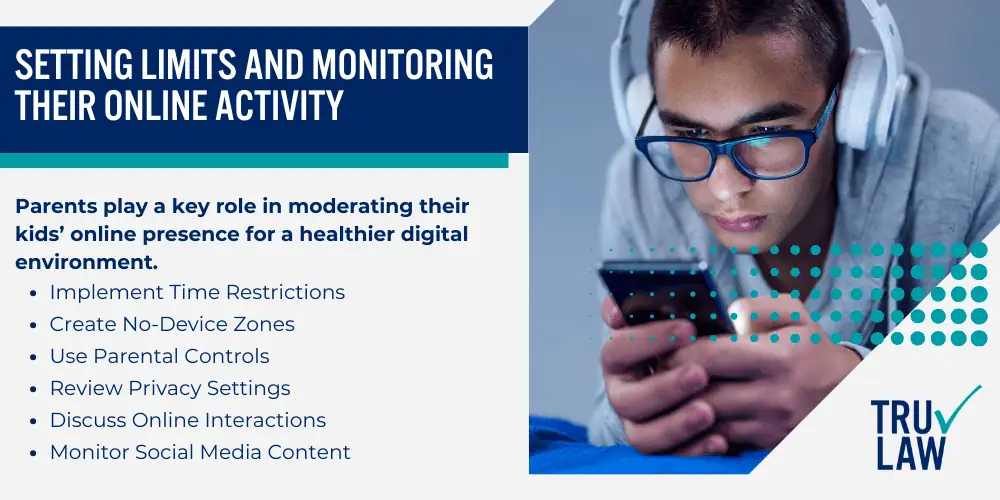
Parents play a key role in moderating their kids’ online presence for a healthier digital environment.
- Implement Time Restrictions: Designate specific times of the day for social media use to prevent excessive browsing. For instance, allow one hour after school and half an hour after dinner.
- Create No-Device Zones: Encourage face-to-face communication by having areas in the home where devices are not allowed, like at the dinner table.
- Use Parental Controls: Employ built-in parental controls on devices to manage what content can be accessed and for how long.
- Review Privacy Settings: Regularly check privacy settings with your child to ensure personal information is protected on different platforms.
- Discuss Online Interactions: Have open conversations about whom they are interacting with online and the nature of those connections.
- Monitor Social Media Content: Be aware of what your child posts and views on their accounts to guard against inappropriate or harmful material.
If you’ve suffered from mental health issues as a result of using these platforms, contact TruLaw today using the chat on this page to receive an instant case evaluation.
Concluding Thoughts
The evidence is clear: our well-being takes a hit when we let social media dictate our lives.
It’s time to take charge of our online habits to protect and enhance our mental health.
Taking steps towards healthier social media use can lead us to more fulfilling and less anxious everyday experiences.
Let’s commit to being mindful of how we engage with these powerful platforms, ensuring they serve as tools for connection rather than sources of distress.
Shifting the way we interact with social media could be the key to a happier, healthier life.
Social Media Harm Lawsuits Frequently Asked Questions
-
Social media can harm your self-esteem and lead to a youth mental health crisis, causing issues like low self-esteem, suicidal ideation, and even self-harm.
Factors such as the quality and quantity of social media use can determine whether it enhances or deteriorates mental health.
If you’ve suffered from mental health issues as a result of using these platforms, contact TruLaw today using the chat on this page to receive an instant case evaluation.
-
Individuals with mental disorders, including depression and psychotic disorders, use social media at rates comparable to the general population.
However, the use of social media may increase the risk of self-harm, loneliness, and a decrease in empathy, particularly among teenagers.
If you’ve suffered from mental health issues as a result of using these platforms, contact TruLaw today using the chat on this page to receive an instant case evaluation.
-
Among males aged 15-24, the number of suicides rose by 30 percent, coinciding with a period marked by increased social media usage.
This correlation highlights a concerning trend in the mental health impacts of social media among teenagers.
If you’ve suffered from mental health issues as a result of using these platforms, contact TruLaw today using the chat on this page to receive an instant case evaluation.
-
Yes, there are legal recourses available for harm caused by digital platforms.
They can range from personal litigation to government regulation, community standards enforcement, antitrust actions, and data protection laws.
If you’ve suffered from mental health issues as a result of using these platforms, contact TruLaw today using the chat on this page to receive an instant case evaluation.

Managing Attorney & Owner
With over 25 years of legal experience, Jessica Paluch-Hoerman is an Illinois lawyer, a CPA, and a mother of three. She spent the first decade of her career working as an international tax attorney at Deloitte.
In 2009, Jessie co-founded her own law firm with her husband – which has scaled to over 30 employees since its conception.
In 2016, Jessie founded TruLaw, which allows her to collaborate with attorneys and legal experts across the United States on a daily basis. This hypervaluable network of experts is what enables her to share the most reliable, accurate, and up-to-date legal information with our readers!
Additional Social Media Harm Lawsuits resources on our website:
Here, at TruLaw, we’re committed to helping victims get the justice they deserve.
Alongside our partner law firms, we have successfully collected over $3 Billion in verdicts and settlements on behalf of injured individuals.
Would you like our help?
At TruLaw, we fiercely combat corporations that endanger individuals’ well-being. If you’ve suffered injuries and believe these well-funded entities should be held accountable, we’re here for you.
With TruLaw, you gain access to successful and seasoned lawyers who maximize your chances of success. Our lawyers invest in you—they do not receive a dime until your lawsuit reaches a successful resolution!
AFFF Lawsuit claims are being filed against manufacturers of aqueous film-forming foam (AFFF), commonly used in firefighting.
Claims allege that companies such as 3M, DuPont, and Tyco Fire Products failed to adequately warn users about the potential dangers of AFFF exposure — including increased risks of various cancers and diseases.
Depo Provera Lawsuit claims are being filed by individuals who allege they developed meningioma (a type of brain tumor) after receiving Depo-Provera birth control injections.
A 2024 study found that women using Depo-Provera for at least 1 year are five times more likely to develop meningioma brain tumors compared to those not using the drug.
Suboxone Tooth Decay Lawsuit claims are being filed against Indivior, the manufacturer of Suboxone, a medication used to treat opioid addiction.
Claims allege that Indivior failed to adequately warn users about the potential dangers of severe tooth decay and dental injuries associated with Suboxone’s sublingual film version.
Social Media Harm Lawsuits are being filed against social media companies for allegedly causing mental health issues in children and teens.
Claims allege that companies like Meta, Google, ByteDance, and Snap designed addictive platforms that led to anxiety, depression, and other mental health issues without adequately warning users or parents.
Transvaginal Mesh Lawsuits are being filed against manufacturers of transvaginal mesh products used to treat pelvic organ prolapse (POP) and stress urinary incontinence (SUI).
Claims allege that companies like Ethicon, C.R. Bard, and Boston Scientific failed to adequately warn about potential dangers — including erosion, pain, and infection.
Bair Hugger Warming Blanket Lawsuits involve claims against 3M — alleging their surgical warming blankets caused severe infections and complications (particularly in hip and knee replacement surgeries).
Plaintiffs claim 3M failed to warn about potential risks — despite knowing about increased risk of deep joint infections since 2011.
Baby Formula NEC Lawsuit claims are being filed against manufacturers of cow’s milk-based baby formula products.
Claims allege that companies like Abbott Laboratories (Similac) and Mead Johnson & Company (Enfamil) failed to warn about the increased risk of necrotizing enterocolitis (NEC) in premature infants.
Here, at TruLaw, we’re committed to helping victims get the justice they deserve.
Alongside our partner law firms, we have successfully collected over $3 Billion in verdicts and settlements on behalf of injured individuals.
Would you like our help?
